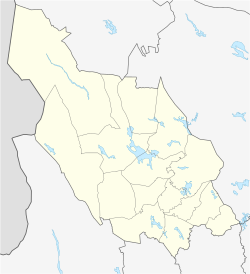Grängesberg
| Grängesberg | |
|---|---|

|
|
| Coordinates: 60°05′N 14°59′E / 60.083°N 14.983°ECoordinates: 60°05′N 14°59′E / 60.083°N 14.983°E | |
| Country | Sweden |
| Province | Dalarna |
| County | Dalarna County |
| Municipality | Ludvika Municipality |
| Area | |
| • Total | 7.72 km2 (2.98 sq mi) |
| Population (31 December 2010) | |
| • Total | 3,481 |
| • Density | 451/km2 (1,170/sq mi) |
| Time zone | CET (UTC+1) |
| • Summer (DST) | CEST (UTC+2) |
Grängesberg is a locality situated in Ludvika Municipality, Dalarna County, Sweden with 3,481 inhabitants in 2010.
The town was earlier dominated by iron-ore extraction at Grängesberg ore field (Grängesbergs malmfält) from the 16th century to 1989. In January 1990 was the last ore-train from Grängesberg to Oxelösund.
Grängesbergsbolaget had during a long period the world's largest iron-ore fleet and by 1899–1900 was it Sweden's most profitable company. During this time Grängesberg grew very fast, and during a 10-year period the town's population increased threefold. Today Spendrups is Grängesberg's biggest employer.
The area is famous of its Railway Museum of Grängesberg.
...
Wikipedia


